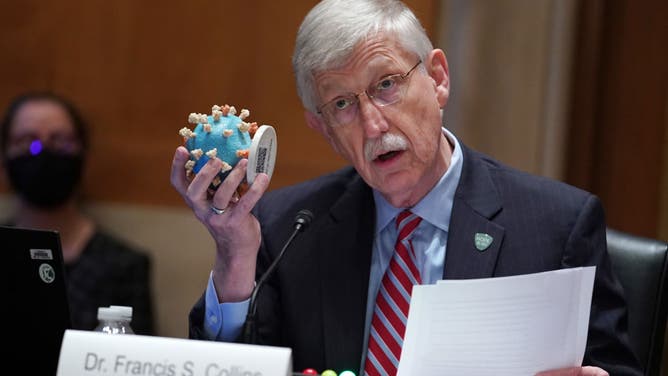Our Worst Suspicions About Covid Health Officials Were Just Confirmed | Mary Katharine Ham
In the early 20th century, influential Swiss psychologist Jean Piaget developed an exercise to gauge the egocentrism of young children. Piaget was trying to make sense of cognitive development using what came to be known as the Three Mountain Problem. In the experiment, a child was presented with a 3-D model of three mountains, all with different heights and signifiers— snow on one peak, a little house perched upon another.
The child was given the opportunity to survey the model from all sides, getting the lay of the land. Piaget would then place a doll somewhere inside the model and ask the child to identify the doll’s view from a series of photographs. Piaget found that children of 4 often chose their own view of the mountains, unable to imagine it from another perspective. Once children hit 7 or 8, they were able to consistently choose the photograph that best represented the doll’s view.
I was reminded of this work in childhood cognitive development this week a) because I have a toddler who reminds me of it every day. But b) because I watched the former head of the National Institutes of Health, Francis Collins, explain the "public health mindset" in a viral video.

WASHINGTON, DC - MAY 26: National Institutes of Health Director Dr. Francis Collins holds up a model of the coronavirus as he testifies before a Senate Appropriations Subcommittee looking into the budget estimates for National Institute of Health (NIH) and the state of medical research on Capitol Hill, May 26, 2021 in Washington, DC. (Photo by Sarah Silbiger-Pool/Getty Images)
Health Officials Had Tunnel Vision On Covid
Speaking in 2023 at a gathering of Braver Angels, a non-profit designed to lessen American political polarization by bringing people of differing viewpoints together, Collins admitted that considering other viewpoints outside a certain zip code wasn't part of his job description. Here’s how he described his and other public health officials’ response to the Covid 19 pandemic.
"As a guy living inside the Beltway feeling a sense of crisis trying to decide what to do in some Situation Room in the White House with people who had data that was incomplete, we weren’t really thinking about what that would mean to family in Minnesota, a thousand miles away from where the virus was hitting so hard. We weren’t really considering the consequences in communities that were not New York City or some other big city."
Covid Lockdowns Touched Every Aspect Of Life
The metropolitan parochialism he describes is so common among policymakers and national politicians, it’s almost cliche. But it’s rarer to see such a straightforward confession of being completely out of touch with the American population outside its population centers. There were many times during the pandemic, watching the responses of public health officials when I wondered, "has public health ever met a member of the public?" If Collins’ description is to be believed, it’s a cartoonish blind spot. It’s commendable Collins is acknowledging and lamenting it, in a forum where he is called upon to confront other viewpoints, even three years late. But it was obvious in real time, and this is important— it was fixable. Any public servant who is able to recognize this problem exists, should also recognize it as a problem of the first order, likely to doom whatever good he’s trying to do.

PALO ALTO, Calif. - A view of an empty Stanford Shopping Center in Palo Alto as Santa Clara County entered into its second lockdown in California on December 14, 2020. In downtown San Jose, restaurants were once again closed to all but take-out or delivery. (Photo by Neal Waters/Anadolu Agency via Getty Images)
Collins went on:
"If you’re a public health person and you’re trying to make a decision, you have this very narrow view of what the right decision is and that is something that will save a life. It doesn’t matter what else happens."
Again, a frank admission of a bad way of thinking. Many of us suspected this was the case, and criticized public health officials like Collins for exactly this myopia in 2020. Later in the discussion, Collins says he’s learned "how critical it is for those kinds of policy decisions to reflect the realities of each community," eschewing "blanket recommendations" for a vast and diverse nation in the future. One can hope, but in 2020, those criticisms were met with disdain and censorship, particularly for the public-health dissidents of the Great Barrington Declaration, whom Collins himself tried to discredit in concert with Anthony Fauci, according to his emails and public statements. He now calls its authors "very distinguished in their credentials," but at the time called them a "fringe component of epidemiology" and their ideas "dangerous" to The Washington Post as he orchestrated a "quick and devastating published take down."
Varying Opinions On Coronavirus Not Often Welcomed
Instead, Collins could and should have confronted his critics and welcomed debate in public. A free society was facing a novel threat with limited data.

Dr. Anthony Fauci, director of the National Institute of Allergy and Infectious Diseases, speaks about Covid during the White House press briefing on November 22, 2022. (Tom Williams/CQ-Roll Call, Inc via Getty Images)
But there’s more:
"So you attach infinite value to stopping the disease and saving a life," Collins told this gathering. "You attach a zero value to whether this actually totally disrupts lives, ruins the economy, and has many kids kept out of school in a way that they never quite recovered."
That is a nifty equation public health has created for itself. In this formula, any action by health officials is so valuable that it can never be outweighed by considerations outside of public health. No wonder they didn’t debate. Their actions were not debatable, by design. It doesn’t matter how disruptive or vanishingly effective against the virus, the action itself is more valuable than costs to the daily lives’ of citizens, their livelihoods, and their educations, combined.

BROOKLYN, NY - Jade Rosier, a high school junior, marks the one-year anniversary of school on Zoom conference calls by spending the day attending school from her home living room, March 11, 2021. (Photo by Andrew Lichtenstein/Corbis via Getty Images)
Health Officials Didn't Always See Big Picture During Covid
Without snark, this is literally a child’s way of thinking. If you’re thinking this way as an adult, it is a sort of self-imposed stunted cognitive development. My toddler attaches infinite value to the banana she wants at this very moment and zero value to the time of day, the availability of bananas, what I am doing when she demands the banana. My job is to teach her, as she develops, to consider the world around her as she is making demands and decisions.
"This is a public health mindset," Collins concluded, then acknowledging it was a mistake that lost trust. But what has been done to fix it?
If this is, indeed, the "public health mindset," none of the people in public health should be anywhere near power until they can see the world from other points of view. For my toddler, that will take another couple of years. For public health, I am not so confident.